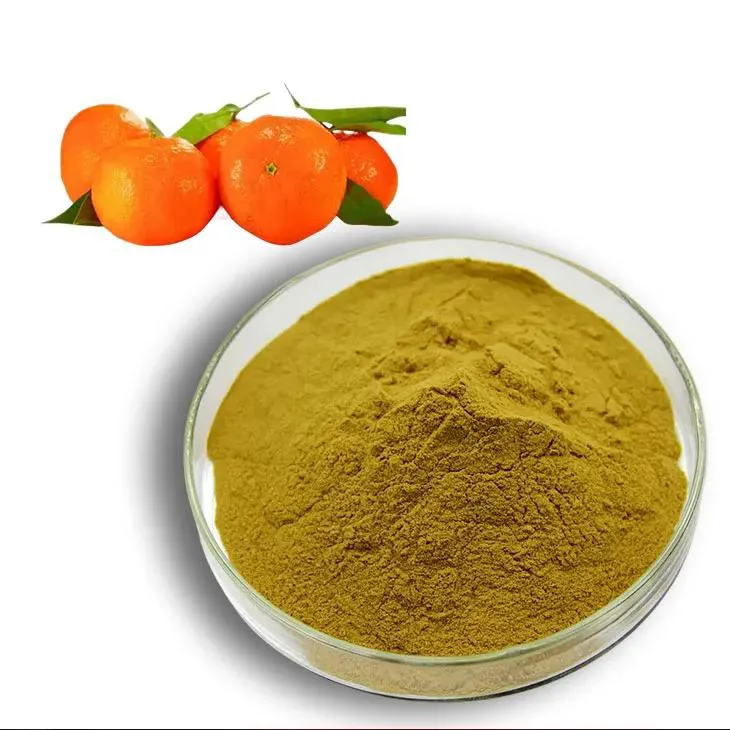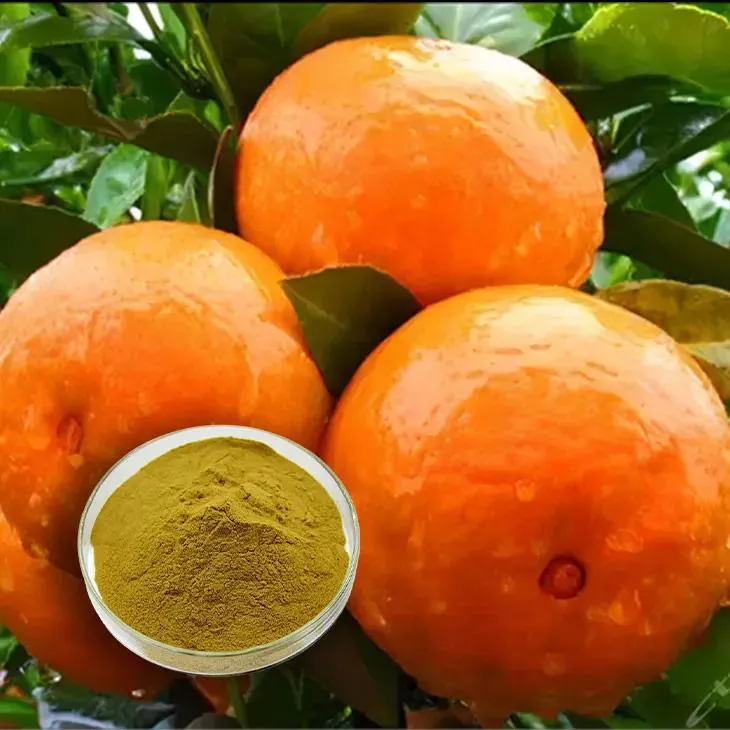- 0086-571-85302990
- sales@greenskybio.com
Are Citrus Bioflavonoids Healthy?
2025-05-18

Citrus fruits, such as oranges, lemons, limes, and grapefruits, are not only enjoyed around the world for their refreshing taste but also for their rich nutrient profile. These fruits are packed with vitamins, minerals, and a specific group of compounds known as citrus bioflavonoids. As interest in natural health and wellness continues to rise, citrus bioflavonoids have captured the attention of researchers and health enthusiasts alike. This article explores the potential health benefits of these compounds, their applications, and their role in promoting overall well-being.
Understanding Citrus Bioflavonoids
Bioflavonoids, also known simply as flavonoids, are a diverse group of phytonutrients found in plants. Citrus bioflavonoids are a subset of flavonoids that are specifically found in citrus fruits. These naturally occurring compounds are responsible for the vibrant colors of the fruits and are concentrated primarily in the peel and pulp.
Citrus bioflavonoids include a variety of specific compounds, such as Hesperidin, Quercetin, rutin, naringin, and Diosmin. Each of these compounds contributes to the unique benefits associated with citrus bioflavonoids, providing antioxidant, anti-inflammatory, and immune-boosting properties.

The Health Benefits of Citrus Bioflavonoids
The potential health benefits of citrus bioflavonoids are vast, with research suggesting that these compounds may play a significant role in promoting health and preventing disease.
1. Powerful Antioxidant Properties
One of the primary benefits of citrus bioflavonoids is their antioxidant activity. Antioxidants are essential compounds that help protect the body from oxidative stress and damage caused by free radicals. Free radicals are unstable molecules that can damage cells, leading to inflammation, aging, and various chronic diseases. By neutralizing free radicals, citrus bioflavonoids help reduce oxidative stress, which may lower the risk of conditions such as heart disease, cancer, and neurodegenerative disorders.
2. Cardiovascular Health
Citrus bioflavonoids have been shown to have a positive impact on cardiovascular health. They support heart health by improving blood circulation, reducing inflammation, and enhancing the strength and integrity of capillaries and blood vessels. The compound Hesperidin, in particular, has been extensively studied for its ability to lower blood pressure and improve cholesterol levels, both of which are critical factors in maintaining cardiovascular health.
3. Anti-Inflammatory Effects
Chronic inflammation is a contributing factor to a wide range of health issues, including arthritis, diabetes, and heart disease. Citrus bioflavonoids possess anti-inflammatory properties that can help alleviate inflammation and reduce the risk of inflammatory diseases. By modulating inflammatory pathways in the body, bioflavonoids help to quiet the immune response and promote healing.
4. Enhancing Immune Function
Immune support is another significant benefit of citrus bioflavonoids. These compounds aid in fortifying the immune system by enhancing the function of immune cells and supporting the body's natural defense mechanisms. The consumption of citrus bioflavonoids may help reduce the severity and duration of colds and flu, making them a valuable addition to any immune-boosting regimen.
5. Skin Health and Anti-Aging
Citrus bioflavonoids also contribute to skin health and may play a role in reducing the visible signs of aging. Their antioxidant properties protect the skin from damage caused by UV radiation and environmental pollutants, which can lead to premature aging, wrinkles, and skin discoloration. Additionally, bioflavonoids can improve skin elasticity and hydration, resulting in healthier, more youthful-looking skin.

Applications of Citrus Bioflavonoids
Citrus bioflavonoids are commonly available as dietary supplements, either alone or in combination with other nutrients, such as vitamin C. They are often used to support general health or target specific concerns, such as circulatory health and immune support.
Moreover, the incorporation of citrus bioflavonoids in cosmetic and skincare products is also increasing, given their potential to improve skin health and combat oxidative stress.

Dietary Sources
Incorporating citrus bioflavonoids into the diet is relatively easy, given their abundance in everyday fruits. Consuming a variety of citrus fruits, such as oranges, grapefruits, lemons, and limes, along with other flavonoid-rich foods like berries, onions, and green tea, can enhance bioflavonoid intake. It is important to include the peel and pulp in your diet when possible, as this is where the highest concentrations of bioflavonoids are found.
Considerations and Potential Side Effects
While citrus bioflavonoids offer a range of health benefits, it is important to consider individual needs and potential allergies. People with citrus allergies or sensitivities should approach citrus bioflavonoid supplements with caution. Additionally, individuals on certain medications should consult with healthcare professionals before supplementing with citrus bioflavonoids, as they may interact with specific drugs, notably those processed through the liver.
Conclusion
Citrus bioflavonoids represent a powerful tool for enhancing overall health and well-being. With their potent antioxidant, anti-inflammatory, and immune-boosting properties, they offer a host of benefits that support cardiovascular health, skin vitality, and more. As research continues to uncover the full potential of these compounds, incorporating citrus bioflavonoids into a balanced diet, either through natural fruit sources or supplements, can contribute to a healthier and more vibrant life.
Whether consumed through fresh citrus fruits or taken as dietary supplements, the inclusion of citrus bioflavonoids in one's nutrition plan can be a simple yet effective step towards improved health. As with any supplement, it is important to seek guidance from healthcare providers, ensuring that the use of citrus bioflavonoids aligns with individual health goals and conditions. In doing so, you can maximize the benefits of these powerful compounds for a healthier, more resilient body.
- ▶ Hesperidin
- ▶ Citrus Bioflavonoids
- ▶ Plant Extract
- ▶ lycopene
- ▶ Diosmin
- ▶ Grape seed extract
- ▶ Sea buckthorn Juice Powder
- ▶ Fruit Juice Powder
- ▶ Hops Extract
- ▶ Artichoke Extract
- ▶ Mushroom extract
- ▶ Astaxanthin
- ▶ Green Tea Extract
- ▶ Curcumin
- ▶ Horse Chestnut Extract
- ▶ Other Product
- ▶ Boswellia Serrata Extract
- ▶ Resveratrol
- ▶ Marigold Extract
- ▶ Grape Leaf Extract
- ▶ New Product
- ▶ Aminolevulinic acid
- ▶ Cranberry Extract
- ▶ Red Yeast Rice
- ▶ Red Wine Extract
-
Mulberry Extract
2025-05-18
-
Motherwort Extract
2025-05-18
-
Withania Somnifera Extract
2025-05-18
-
Hedyotis Diffusa Extract
2025-05-18
-
Bamboo Leaf extract
2025-05-18
-
Saw Palmetto Extract
2025-05-18
-
Phyllanthus Emblica Extract
2025-05-18
-
Acerola Extract
2025-05-18
-
Polygonum multiflorum extract
2025-05-18
-
Tongkat Ali Extract Powder
2025-05-18





















